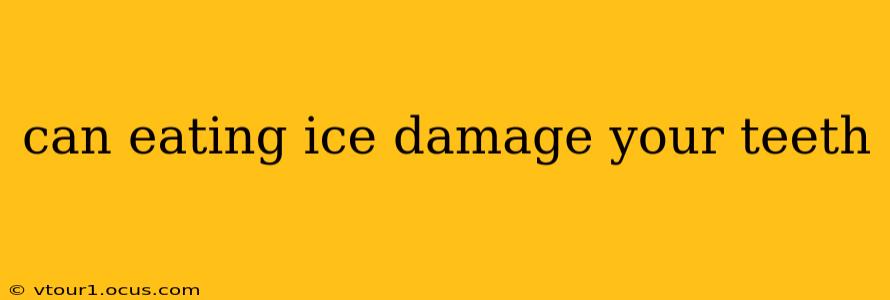Can Eating Ice Damage Your Teeth? The Chilling Truth
Many of us enjoy the refreshing crunch of ice, especially on a hot day. But is this seemingly harmless habit actually damaging our teeth? The short answer is: yes, it can. While the occasional ice cube won't likely cause significant problems, habitual ice chewing can lead to several dental issues. Let's delve into the details.
What Happens When You Chew Ice?
The hardness of ice makes it a surprisingly abrasive substance. When you chew ice, you're essentially subjecting your tooth enamel – the hard, protective outer layer – to significant force and friction. This can lead to:
- Cracked or chipped teeth: The force of biting down on ice can easily fracture or chip your teeth, especially if you have pre-existing cracks or weakened enamel. This can be incredibly painful and require expensive dental work to repair.
- Enamel erosion: The constant friction from chewing ice wears away your tooth enamel over time. Once enamel is eroded, it cannot regenerate, leaving your teeth vulnerable to cavities, sensitivity, and discoloration.
- Increased tooth sensitivity: As enamel wears away, the dentin (the layer beneath the enamel) becomes exposed. Dentin is significantly softer and more sensitive to temperature changes and pressure, leading to discomfort when consuming hot or cold foods and drinks.
How Much Ice is Too Much?
There's no magic number of ice cubes that definitively cause damage. It depends on factors like the strength of your teeth, the frequency of ice chewing, and the force used. However, if you find yourself regularly craving ice, it's a habit worth reevaluating. Occasional indulgence is less likely to cause harm compared to habitual, forceful chewing.
What are the signs of ice-related tooth damage?
Recognizing the signs of damage early is crucial for preventing further problems. Watch out for:
- Sudden, sharp tooth pain: This could indicate a crack or chip.
- Increased sensitivity to hot or cold: This often points to enamel erosion.
- Visible cracks or chips in your teeth: Look carefully in a mirror for any damage.
- Discoloration of your teeth: This could indicate underlying damage.
Can eating ice cause other dental problems?
While the direct impact of chewing ice is the primary concern, it can indirectly contribute to other issues:
- Temporomandibular joint (TMJ) disorder: The repetitive force of chewing ice can strain the jaw joint, leading to pain and dysfunction.
- Increased risk of cavities: Enamel erosion makes your teeth more susceptible to bacterial attack and cavity formation.
How can I protect my teeth from ice damage?
If you enjoy the occasional ice cube, try to minimize the risk by:
- Chewing smaller pieces of ice: This reduces the force exerted on your teeth.
- Choosing softer alternatives: Consider crushed ice or ice chips instead of large cubes.
- Limiting your ice consumption: Moderation is key.
- Regular dental checkups: Regular visits to your dentist can help identify and address any early signs of damage.
Is it okay to eat ice if I have sensitive teeth?
No, if you already have sensitive teeth, you should avoid chewing ice altogether. The abrasive nature of ice will further aggravate the sensitivity and potentially lead to more serious damage.
In conclusion, while the occasional ice cube won't likely cause significant harm, habitual ice chewing can lead to various dental problems. Moderation, awareness, and regular dental checkups are crucial in protecting your teeth from the potentially damaging effects of ice.
